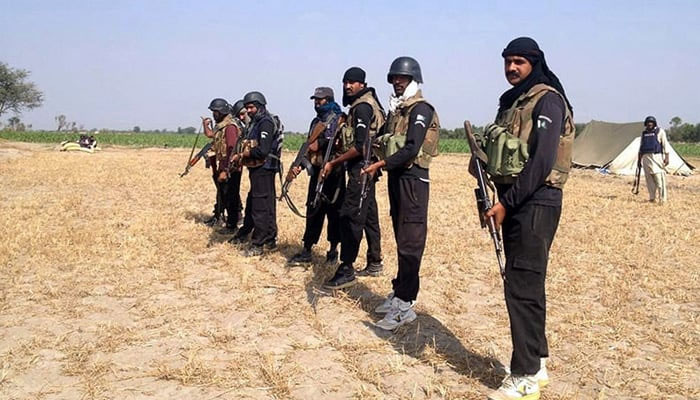Battling bandits
Loss of police personnel raises questions about state’s capacity to effectively combat these criminals
The tragic loss of 12 policemen in Rahim Yar Khan on Thursday serves as a stark reminder of the grave threat posed by the notorious kacha bandits. These hardened criminals, who have long terrorized the riverine areas along the Indus River, launched a deadly attack on two police vans trapped in floodwater, using rockets to devastating effect. The loss of the police personnel raises serious questions about the state’s capacity to effectively combat these well-armed and elusive criminals. After the attack, the Punjab Police launched an operation against the kacha bandits following the Rahim Yar Khan attack and killed the main accused said to be responsible for the attack on the police personnel. Yet, the death of a single ringleader, while a necessary step, is not a solution. The problem of the kacha bandits is far deeper and more complex. These criminals have, for years, exploited the challenging terrain of the riverine areas, using it to their advantage to evade capture and continue their reign of terror. Despite multiple operations over the years, the bandits remain a potent threat, raising troubling questions about the effectiveness of previous efforts and the adequacy of the resources and strategies employed. In an interview with a local channel, Inspector General (IG) of Punjab Police Dr Usman Anwar said that the Punjab Police has strategically established 70 posts near the riverine areas so that these kacha bandits cannot infiltrate populated areas and cross into Punjab from neighbouring areas like Sindh. About 65 bandits have been killed while over a hundred have been wounded in an ongoing operation.
The disturbing fact is that these criminals are equipped with advanced weaponry, often outgunning the police. This disparity in firepower is not just a tactical disadvantage; it is a glaring failure of the state to adequately equip its law-enforcement agencies. Where are these weapons coming from? How are they being smuggled into the kacha areas? And perhaps most disturbingly, are these criminals operating with the tacit support of local influential figures, or are they simply so entrenched that they no longer need external backing? The lack of clarity surrounding the origins and motivations of these bandits only adds to the complexity of the challenge. Unlike terrorists, whose ideologies and backers are often well-documented, the kacha bandits seem to operate with a singular focus on profit through criminal activities. This makes them unpredictable and difficult to counter. However, their criminality, devoid of any ideological façade, makes them no less dangerous. On the contrary, their ability to strike fear into the hearts of citizens and law enforcement alike makes them a menace that must be eradicated.
The situation demands a decisive and coordinated response. The police forces of Punjab and Sindh must collaborate more effectively, pooling resources, intelligence, and strategies to dismantle the criminal networks that operate in these regions. If necessary, the military should be called in to assist in a comprehensive operation to clear the kacha areas once and for all. The stakes are too high for half-measures. The death of 12 policemen cannot be allowed to pass without a meaningful and sustained effort to bring those responsible to justice and to restore the rule of law in these troubled areas. Pakistan is already facing multiple challenges on various fronts – economic instability, political uncertainty, and a lingering threat of terrorism. The ongoing lawlessness in the kacha areas is a crisis we cannot afford to ignore or leave unresolved. It is imperative that the state asserts its authority and eliminates these criminal elements. The memory of the fallen policemen demands it, and the safety of every citizen depends on it.
-
 ‘Narcissist’ Andrew Still Feels ‘invincible’ After Exile
‘Narcissist’ Andrew Still Feels ‘invincible’ After Exile -
 Shamed Andrew ‘mental State’ Under Scrutiny Amid Difficult Time
Shamed Andrew ‘mental State’ Under Scrutiny Amid Difficult Time -
 Bad Bunny's Super Bowl Halftime Show: What Time Will He Perform Tonight?
Bad Bunny's Super Bowl Halftime Show: What Time Will He Perform Tonight? -
 Where Is Super Bowl 2026 Taking Place? Everything To Know About The NFL Showdown
Where Is Super Bowl 2026 Taking Place? Everything To Know About The NFL Showdown -
 Chris Pratt Explains Why He And Katherine Schwarzenegger Did Premarital Counseling
Chris Pratt Explains Why He And Katherine Schwarzenegger Did Premarital Counseling -
 Drake 'turns Down' Chance To Hit Back At Kendrick Lamar At Super Bowl
Drake 'turns Down' Chance To Hit Back At Kendrick Lamar At Super Bowl -
 Sarah Ferguson Had A ‘psychosexual Network’ With Jeffrey Epstein
Sarah Ferguson Had A ‘psychosexual Network’ With Jeffrey Epstein -
 Miranda Kerr Shares The One Wellness Practice She Does With Her Kids
Miranda Kerr Shares The One Wellness Practice She Does With Her Kids -
 Czech Republic Supports Social Media Ban For Under-15
Czech Republic Supports Social Media Ban For Under-15 -
 Khloe Kardashian Shares How She And Her Sisters Handle Money Between Themselves
Khloe Kardashian Shares How She And Her Sisters Handle Money Between Themselves -
 Prince William Ready To End 'shielding' Of ‘disgraced’ Andrew Amid Epstein Scandal
Prince William Ready To End 'shielding' Of ‘disgraced’ Andrew Amid Epstein Scandal -
 Chris Hemsworth Hailed By Halle Berry For Sweet Gesture
Chris Hemsworth Hailed By Halle Berry For Sweet Gesture -
 Blac Chyna Reveals Her New Approach To Love, Healing After Recent Heartbreak
Blac Chyna Reveals Her New Approach To Love, Healing After Recent Heartbreak -
 Royal Family's Approach To Deal With Andrew Finally Revealed
Royal Family's Approach To Deal With Andrew Finally Revealed -
 Super Bowl Weekend Deals Blow To 'Melania' Documentary's Box Office
Super Bowl Weekend Deals Blow To 'Melania' Documentary's Box Office -
 Meghan Markle Shares Glitzy Clips From Fifteen Percent Pledge Gala
Meghan Markle Shares Glitzy Clips From Fifteen Percent Pledge Gala




